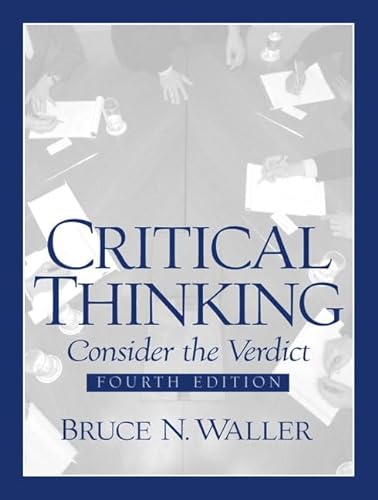Items related to Critical Thinking: Consider the Verdict (4th Edition)

Organized around lively and authentic examples drawn from jury trials, contemporary political and social debate, advertising, etc., this introduction to critical thinking shows readers not only how to detect fallacies, but also how to examine, appreciate, and construct cogent arguments as well. Accessible and reader friendly--yet thorough and rigorous--it shows them how to integrate all their logic skills into the critical decision-making process they undertake in their own lives as citizens and consumers. What's the Question? Relevant and Irrelevant Reasons. The Burden of Proof. Analyzing Arguments. Necessary and Sufficient Conditions. Symbolic Sentential Logic. Arguments About Classes. Ad Hominem Arguments. Appeal to Authority. The Truth, the Whole Truth, and Nothing but the Truth. Strawman, Slippery Slope, Dilemma, and Golden Mean Arguments: Their Use and Abuse. Begging the Question. Arguments by Analogy. Questions of Cause. Thinking Critically about Statistics. Consider Your Verdict: Comprehensive Critical Thinking in the Jury Room. For anyone interested in developing skills in critical thinking, informal and general logic, and critical writing or argumentation.
"synopsis" may belong to another edition of this title.
Critical thinking is a valuable skill: whether you are deciding what toothpaste to use or what stocks to buy; which job to pursue or which courses you should take; what candidate to vote for or what cause to support; or which reports to believe and which claims to reject. But one of the most important places for careful critical thinking is in the jury room. Serving on a jury is one of the most significant and basic ways that citizens actively participate in their government, and effective jury sevice requires a great deal of citizens. Jurors must set aside any biases and judge the issues fairly; they must reason carefully about what laws are involved, and how those laws apply to the particulars of the case at hand; they must evaluate testimony, and weigh both its accuracy and its relevance; they must give a fair hearing to both sides, distinguish sound from erroneous arguments, and ultimately reach a just and reasonable conclusion.
The courtroom demands a high level of critical thinking skill, and it is also a fascinating place for studying the key elements of critical thinking: determining exactly what the conclusion is and who bears the burden of proving it; separating false claims from reliable information; and distinguishing between erroneous and compelling arguments. The skills that make you an effective juror will also make you an intelligent consumer, an effective planner, and a wise citizen.
Critical Thinking: Consider the Verdict, Fourth Edition uses the jury room as the focus for developing basic skills in critical thinking, but it does not stop there. Those skills are also applied to the various arguments and issues that arise in our daily lives as consumers, students, investors, planners, and citizens. Thus, while the courtroom provides the overall framework, most of the exercises and examples are drawn from advertisements, social debates, political campaigns, and editorials. Critical thinking skills are valuable in the jury room, but they are also valuable in the classroom, the boardroom, the laboratory, and the shopping mall.
This book provides a solid and substantial introduction to critical thinking, and Chapters 8 and 9 offer instruction in symbolic logic. Chapters 8 and 9 are self-contained, and you may do either or both at any point. If you wish to concentrate on informal logic, you may skip Chapters 8 and 9 altogether. The boxed exercises and examples scattered throughout the text are not essential to understanding the chapters, but they do present some interesting material and challenging questions. You can skip them, but you'll miss a lot of the fun.
Readers learn to analyze, understand, and construct the sound arguments that are vital to our lives as citizens and consumers, jurors and voters. The author also explains how to detect argument errors and deceptions.
The Fourth Edition features:
- extensive new material throughout
- an entirely new chapter on thinking critically with statistics
- dozens of exercises from criminal and civil trials, Supreme Court decisions, and contemporary social debates.
"About this title" may belong to another edition of this title.
- PublisherPrentice Hall
- Publication date2000
- ISBN 10 0130896039
- ISBN 13 9780130896032
- BindingPaperback
- Number of pages480
- Rating
Buy New
Learn more about this copy
Shipping:
US$ 3.99
Within U.S.A.
Top Search Results from the AbeBooks Marketplace
Critical Thinking: Consider the Verdict (4th Edition)
Book Description Paperback. Condition: New. New Paperback! Pristine unmarked pages, may have very slight warehouse wear, no remainder marks, still a great buy straight from warehouse unread, sealed in plastic, exact artwork as listed, Seller Inventory # 193161029148
Critical Thinking: Consider the Verdict (4th Edition)
Book Description paperback. Condition: New. New. book. Seller Inventory # D8S0-3-M-0130896039-6

